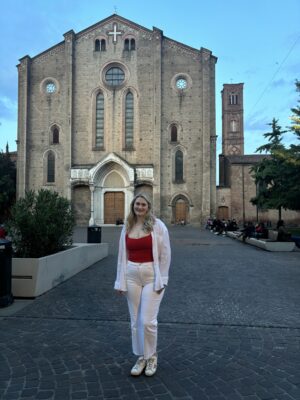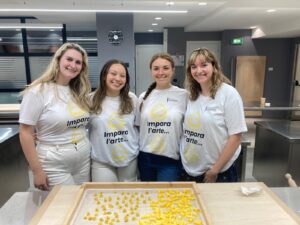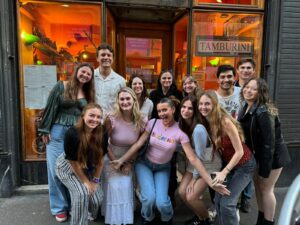Maymester Q&A: Immersing in Italian culture
 Jacqueline Welsh, Class of ’26, has wanted to go back to Italy since living there during her childhood. She was interested in learning more about the country as an adult in an academic setting, so the Vanderbilt Maymester program was the perfect option. A double major in communication studies and English, Jacqueline recently explored Italy in the Maymester course Made-in-Italy: Italianness in Italy and Abroad, A Culinary Journey. She shares why she chose the course, what she learned, and how the course influenced her studies at Vanderbilt.
Jacqueline Welsh, Class of ’26, has wanted to go back to Italy since living there during her childhood. She was interested in learning more about the country as an adult in an academic setting, so the Vanderbilt Maymester program was the perfect option. A double major in communication studies and English, Jacqueline recently explored Italy in the Maymester course Made-in-Italy: Italianness in Italy and Abroad, A Culinary Journey. She shares why she chose the course, what she learned, and how the course influenced her studies at Vanderbilt.
Q: Why did you sign up for this class specifically?
A: I chose to take this course because of my fascination with Italian culture. I thought I had a pretty good understanding of the culture coming into the class, but Dr. Anna Marra, who is from Italy, really opened my eyes to the depth of Italian culture. The history of the food was completely unknown to me. I also took this course because of my career interests—it didn’t fulfill anything for my major, but I want to be a travel journalist. Journalists need to be educated and have a niche, so this class helped with my career goals.
Q: What were your assignments like?
A: Our assignments mostly included writing reflections on our experiences in Italy. We had weekly journals to turn in and readings with discussion boards. We also had a final project that we could design, as long as it related to the class. I wrote a feature article, “Guide to Bologna.” We also had a handful of group presentations where we taught the class certain things we researched, such as food specialties from different regions or experiences we had. Each weekend we also had to write a weekend itinerary to show Dr. Marra what we had planned and how it factored into our learning. We had many field trips, and guest lecturers came to our class to talk about food culture, as well as the health and science behind food. Multiple times a week we had cooking classes at Portici Academy, which is a Michelin-starred restaurant. The chefs were strict, but I learned more than I ever could have imagined. We also had free weekends to spend in Italy, so I visited Cinque Terre, Florence, and Sardinia.
I am a better American because of my time in Italy.
Q: What did this experience teach you?
A: In the most basic terms, this course taught me about the depth of Italian food culture—how recipes were created, when Italian food became what it is, how regions differ in food, what the regional specialties are, the history of cooking, traditional dishes in Emilia-Romagna and how to prepare them, and food taboos/rules. On a deeper level, this class taught me what it means to be Italian. Even though I have zero Italian in my DNA, I feel deeply connected to the Italian mission: living slow. This is visible through how they prepare food, how they eat food, and their lifestyle. During our class we were asked if we thought we were living an “authentic Italian experience.” Thinking about it now, I think we were. Even though it wasn’t our forever reality, we made the experience as true to everyday Italian life as we could. We paid rent, bought groceries, and went to the laundromat. We drank our cappuccinos in the morning. We took upwards of three hours to eat our dinner after 8 p.m. every night. We started conversations with strangers, and we gave up our personal space. Sometimes it’s more about immersing yourself in a culture and gaining life experience than it is about sitting in a classroom and taking notes. I’ll never forget my Maymester because of how immersive it was. I am a better American because of my time in Italy.
 Q: How did this course impact how you think about the topic(s) you were studying?
Q: How did this course impact how you think about the topic(s) you were studying?
A: In terms of how this impacted my major, the Maymester has given me more to write about. In most of my courses, especially my English courses, I write about things I’ve done or seen in the world. You can’t be a writer without anything to write about, and living life is just as important as learning how to write in a classroom. As a communication studies major, the class also made me realize how much communication techniques vary from country to country, in terms of rhetoric and medium. I love languages, and dusting off my Italian was something I was looking forward to when starting the course. While in Italy, I realized how many sayings and phrases are specific to Italian culture. It made me wonder how Italian communication differs from English (American) communication.
I am a better person for going on a Maymester, and I feel more confident in what I bring to the classroom and the job market.
Q: Would you recommend Maymester to other students?
A: I could not recommend Maymester enough. Whether a Vanderbilt student decides to travel to Honduras, Italy, or Bali, they’re going to learn an insane amount about themselves and what they’re studying. I am a better person for going on a Maymester, and I feel more confident in what I bring to the classroom and the job market. Knowing about America is good, but knowing about the world is great.
Jacqueline’s five tips for visiting Italy
- Italians dress for the season, not the weather. Be prepared to see people in puffer jackets in April. It’s difficult not to look like an American, but if you want to blend in a little more, try to dress per the season.
- Cappuccinos are a common variation of coffee in Italy. Italians only drink this as a breakfast coffee, because they think dairy hinders digestion. Don’t order a cappuccino after breakfast (only before 11 a.m.).
- Speaking a little Italian goes a long way. Say “buongiorno” in the mornings. Say “buonpomeriggio” in the afternoon. Say “buonasera” in the evenings. “Ciao” is used for hello and goodbye. “Grazie” is thank you. Make sure to practice pronunciation before arriving in Italy so they can understand what you’re saying.
- Each region in Italy has certain specialties, and Italians are very strict about their pasta. Knowing this, you should try to order based on regions. Don’t go to Bologna and order cacio e pepe, as it is a Roman dish. Order tagliatelle al ragu, which is Bolognese.
- Dinner is at 8 p.m. or later, and it can last anywhere from an hour to three hours. Most people have aperitivo before dinner, then antipasti (appetizers), then primi (starch dish), then secondi (protein dish), then dulci (dessert), then digestivo. It’s a long and filling process. Take life slowly, like Italians do.
